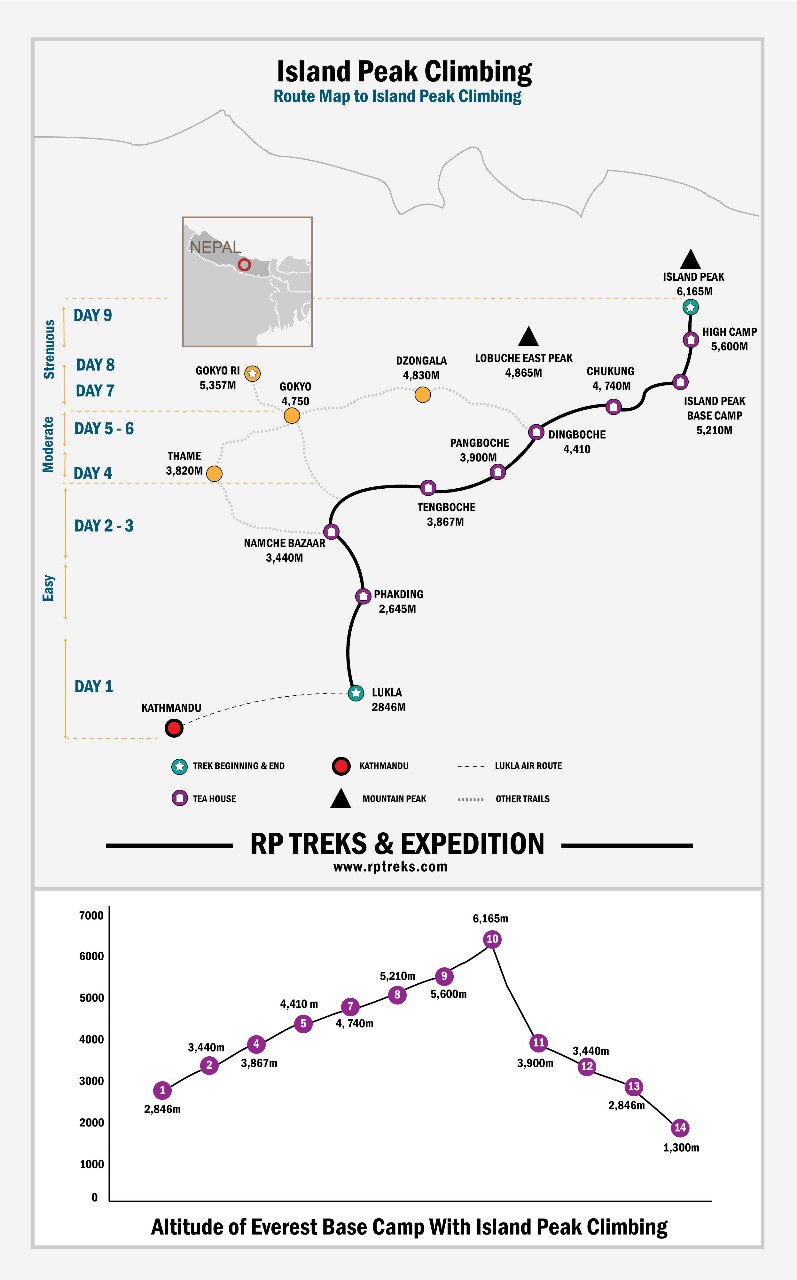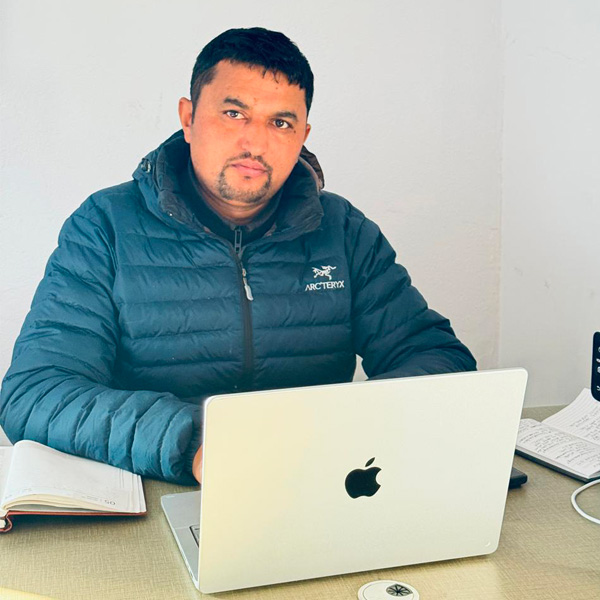
Island Peak, located at 6189 meters above sea level, is one of the most popular climbing peaks in Nepal. Island Peak is also known as Imja Tse in the local language. This peak allows you to experience high-altitude climbing and see amazing views of Everest, Lhotse, Makalu, and Ama Dablam.
Climbing Island Peak is physically hard but not technically challenging therefore this peak can also be considered as the training grounds for peaks above 7000 meters. This peak was attempted for the first time in 1953 as a training base for Everest Expeditions by Edmund Hillary and Tenzing Sherpa in 1953.
The path they found back then is still the one used today. This Peak remains a top choice for people training to climb Everest because of many of the skills needed, like crossing crevasses with ladders and using jumars on a fixed-line.
Climbing this beautiful peak requires a special climbing permit from the Nepal Mountaineering Association (NMA). To make the journey more adventurous, comfortable, easier, and memorable, It’s best to climb in the spring and the autumn.
Climbing Permit
The Island Peak climbing permit is issued by the Nepal Mountaineering Association (NMA). The cost of the NMA permit varies depending on the seasons you choose to climb. To make your journey hassle-free the trekking agency will help to obtain this permit on your behalf.
- In Spring (March to May) climbing permit costs – 250$ per person
- In Island Peak autumn(September to November) climbing permit costs – 125$ per person
- In Winter (December to February) climbing permit costs- 70$ per person
- In Summer (June to August) climbing permit costs – 70$ per person
Garbage Deposit
Along with the climbing permit issued by the NMA, climbers are required to pay a refundable garbage deposit of USD 500 to the NMA. This deposit ensures responsible waste management and is refunded upon completing the climb.
Documents Required for the Garbage Transfer
- A formal request from your agency is required for garbage transfer services.
- You must present the receipt issued by the Nepal Mountaineering Association (NMA) as evidence of the garbage deposit.
- Additionally, a clearance letter is required from the Sagarmatha Pollution Control Committee (SPCC) or authorized personnel. This letter must confirm the proper disposal of the garbage
Local Area Permit
Where to Obtain: The Khumbu Rural Municipality Entrance permit is exclusively available upon arrival in the Sagarmatha region, notably in Lukla. It cannot be obtained in Kathmandu or any other location outside the Sagarmatha region.
Cost: The fee for the local area permit is USD 20 per person. This contribution aids in the upkeep and enhancement of local area infrastructure.
Island Peak Climbing in Peak Season
Spring Season(March to May)
Spring is one of the best seasons to climb the island peak. During these seasons the majestic view of the mountain is possible throughout the trek. Also, the perfect weather conditions make the climbing more comfortable and easier. The temperature ranges from 15-20 degrees Celsius during the daytime while the nighttime temperature can go below -10 degrees Celsius.
You can find greenery everywhere. The rhododendron flowers blooming in the high-altitude forest areas make the trail path more beautiful. Seeing the fresh buds, colorful flowers, and singing birds in the forest will make you happy and satisfied during the trek.
Autumn Season (September to November)
Autumn is another best season for Island Peak Climbing. After the end of the monsoon season, the perfect weather conditions and the clear sky make the climbing conditions perfect for the climbers. Even though the trail path is not covered with blossom flowers in the spring, the beautiful landscape and active waterfall and rivers make the trail path more beautiful.
The temperature during the day time ranges from 0-15 degrees Celsius and in the night time can go below -10 degrees Celsius. Autumn is best for outdoor adventure due to stable weather conditions. Even though Autumn is considered the best time still you need to prepare in advance for the sudden weather change in the mountain.
Gokyo Lake Off-Season
Monsoon(June to August)
During the monsoon season, from June to August, the region experiences heavy rainfall and unpredictable weather conditions. Climbing Island Peak is not advisable during this time due to the heightened risks associated with monsoon weather. While attempting the Island Peak climbing during the monsoon there are several risk factors such as flash floods, landslides, and avalanches. Also, the trail path becomes slippery due to heavy rainfall which can lead to injury.
Due to poor visibility and clouds covering the sky, it makes it hard to enjoy scenic views of the region. Also, leeches and mosquitoes can cause trouble during the journey in the high-altitude area.
Winter Season (December to February)
Winter starts in December and ends in January. It presents the most challenging conditions for the Island Peak climbing. The temperature ranges from -10 to – 20 degrees Celsius during the daytime and at night time it can go below -25 degrees Celsius. Extreme cold temperatures demand more clothing and gear and if you are exposed to the cold you might get cold, frostbite, or hypothermia.
Also during the winter, you can expect the heavy snowfall and extreme cold to make it difficult for the climbers to summit. Another difficult factor to climb in the winter is the short daytime which makes it difficult to reach the destination in timeframe.
Final Say
Island Peak climbing offers an exhilarating adventure with a majestic view of the surrounding landscape and jaw-dropping mountain views. To make the climbing experience more comfortable, easier, and memorable we suggest you climb during the Spring and the Autumn season.
Despite its challenges, Island Peak offers a remarkable opportunity for climbers ranging from advanced beginners to intermediates. This peak will test the climbing skills and help to grow in the mountaineering journey. Before embarking on this peak you need to prepare well and follow the proper guidance.
If you have queries regarding the Island Peak climbing or want to book with our expert team you can WhatsApp or contact us. Our dedicated team will assist you to create unforgettable memories that you will cherish for a lifetime.
Posted on



